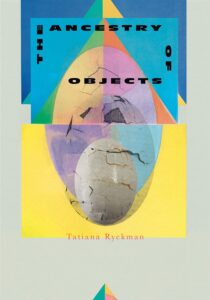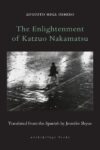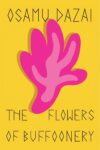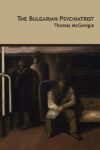
[Deep Vellum Publishing; 2020]
Tatiana Ryckman strategically presents her latest work, The Ancestry of Objects, nestled outside of the terms and rules usually used to describe literature. Her unnamed narrator’s central conflict is set in a landscape of undefined and innovative uses of language, form, and grammar. Ryckman’s thickly lyrical language declines to commit to being either poetry or prose, while The Ancestry of Objects is a novella — between a novel and a short story. In these places neither here nor there, we find our dissociating heroine, presenting herself in plural, personal pronouns. Ryckman’s use of grammar illustrates that her narrator houses within her a plurality that disables her from seeing herself as a unified front. She tells us about herself early in the novella saying, “We are replaceable, so we will be replaced. Our life, so long unnoticed even by us, suddenly accelerating toward an inevitable end.” Within these nonspecific spaces, the narrator’s search to define herself begins with a yearning for an end to the chaos, and Ryckman brings the reader along through an exploration of the surprisingly overlapping territories of grief, sex, and religion.
Ryckman offers despair as the greatest filter to deconstruct the self. The narrator’s grief for her grandparents, who die close together, includes her inability to even register them as dead. She interacts with her dead grandparents as if they were ghosts, still present but no longer physically there. The house she once shared with them feels transformed into a functional tomb where she’s buried herself alive. Without her grandparents, the selves within her have come unattached and her plurality begins:
Our grandfather would say Patience is a virtue. He would say Good things come to those who wait. Now, now, our grandmother would say, a mask of comfort over a plea to be quiet, to need nothing, to be more convenient. Now. And we fall asleep, our hair weaving itself into the fibers that hold us in place.
Ryckman’s use of plural pronouns is distinctive. The narrator’s plural description of herself doesn’t touch on the idea of alternative personalities, nor are the plural pronouns used as a singular they/them, signifying gender nonconformity. Instead, the grammar places us inside the narrator’s mind as her selves communicate with each other, illustrating the idea of a singular person not properly tied together. She is a woman falling apart from grief, and effectively, she dissociates, becoming many different people all poorly attached to reality.
The immediate antidote to dissociation is a sensory experience, and the event we come to over and over again is sex. The Ancestry of Objects is a novella about the narrator’s affair with David, a married man. They meet when the narrator is suicidal, and the mirage of their relationship becomes a distraction from her despair. She tells us, “his cock still sliding along the lips of us, his tongue pressing into our mouth. The instant is prolonged as if forever. It is the infinite moment just before we pull the razor across the skin and know we could stop but won’t.” Their relationship propels the narrator toward further chaos, offering both the potential for further destruction as well as the possibility to rebuild herself.
Religion once presented the narrator with a framework under which to arrange herself. Her grandparents used to enforce its regulations. After their deaths, the narrator finds contraband items they confiscated from her in a dresser drawer: “The skeleton keychain with jeweled eyes, a picture of a gun torn from a magazine, a stolen blood-red nail polish, . . . a crucified Jesus hanging grotesquely by a jump ring in the chain. A graven image. We touched them all with the reverence of religious relics, evidence of our former selfhood.” Without her grandparents, the narrator has fallen out of line. Her illicit affair with a married man means her sexual behavior is not socially acceptable, while her identity is no longer normative, transforming from singular to plural as a result. Worse yet, the rules which used to shape her world no longer hold water. Ryckman’s use of plural pronouns at times make the narrator seem like a human possessed by demons.
In The Year of Magical Thinking, a memoir of grief and its disorder, Joan Didion arrives at an agonistic point of view. She calls this, “no eye on the sparrow,” using the bastardization of the popular church hymn to express her rejection of a personal God caught up in the details of human grief. When the Bible explores the meaning of suffering in the Book of Job, Job’s misfortune is not caused by his actions but instead by a bet God is willing to use Job’s life as collateral to win. In the New Testament, Jesus’ disciples ask why a man is blind, saying, “who sinned, this man or his parents?” Jesus replies neither sinned, but instead the man was afflicted only so the miracle of restoring his sight could be performed. Suffering and grief are random and chaotic in these depictions, as well as impossible to conflate with the ideas of a personal God or an ordered world. During the chaos of her grief, Ryckman’s narrator finds herself truly deserted, having lost her grandparents, her framework for behavior and identity, and her faith. Her self fractures as a result. She turns to her love affair with David looking for a replacement, telling us, “Our mouth to his, his hands pull down our underwear, pull our hair, unfasten his belt, and his fingers slide inside of us. We are overwhelmed by the many places he occupies at once, stunned by this omnipresence.”
Ryckman uses a clever and dirty trick to show the replacement of a personal God by David; she mirrors experiences of masturbation. At one point the narrator tells us, “God is watching you, they said; and at night, when our legs ached, we cried for forgiveness for the sins God had watched all day, a voyeur. For touching ourself, for unkind thoughts, for boredom. It is easy to trust in the all-seeing power of those we worship.” When the suffering narrator fractures into her plurality, having rejected the idea of a personal God, it is David who extends an alternative type of faith, as well as substitute for divinity. The narrator tells us, “And when we touch ourself now, we do not pray for forgiveness; we pray that David is watching.” Her lover becomes her God.
Later in the novella, the sex scenes begin to pivot and offer validation of the narrator’s endurance, hinting towards hope for her survival. The narrator becomes almost mechanical, acting on impulse in these passages. David’s directions begin to override and interfere with the narrator’s own competency during sex. They also begin to mirror the reprimanding of religion: “Don’t touch, for your body is a temple. Don’t be that way, who will want you? Be good. Be a good girl.” Ryckman’s replacement of religious authority with that of a lover calls to mind Sylvie Baumgartel’s Song of Songs, which presents a dom/sub relationship with God using the language of Biblical poetry. Baumgartel writes, “I like squatting for you. I like showing you. Every time I come I’m a little closer to you, God, to you, closer.” While Baumgartel is interested in God as lover, Ryckamn is interested in the lover as God. David, however, proves more of a false God, telling the narrator things like, “That’s a good girl, ride my cock like a good little slut.” The narrator meanwhile is fully able to think for herself during sex, telling us, “we command him to Feel my tits, but don’t know where the words come from or go.” Still, she clings to his authority even while she can stand on her own, saying, “we do as we always have and obey,” as she’s been taught and conditioned to do through her grandparents’ zealotry.
David offers episodes of sexual intimacy that are deeply visual and sensory experiences, a frenzy of activity and feeling for our stagnant narrator: “Her tears and hair and our sweat and his come scrape onto our teeth and we taste the hollow sound of each slap echoing through the porn of our memory.” Soon, the most banal of scenes become erotic. Early in the novel, a trip to the grocery store is bursting with stimulation: “Our fingers undulate on the bottom of the thin plastic bag so the desiccated bodies of seeds surround our hand in a loose dance held back by the frailest barrier of plastic.” This excess of connection to often overwhelming stimuli contrasts with her experiences of dissociation and failure to connect with her own body. Her affair with David is illicit by nature, and their relationship is difficult to guide into a form. Within this undefined space, their sexual interactions present something separate from sexual desire. The narrator finds fulfillment for the desire of an experience, a reminder of inhabiting a body and liking it. During sex, the narrator’s body functions while the mind struggles to contextualize.
Through Ryckman’s descriptions of sex, we’re reminded that intercourse is also very much a performance. David’s words often feel like stage directions. The narrator explains, finding grounding through instruction, saying,
“David says we are beautiful. David says we are smart. David says we are serious. David says we are too serious. David says to relax. David says we are a slut for his cock. David says we like that. David says we are a good little girl riding that cock. David says to look him in the eye, says he wants to see our pretty green eyes when he comes.”
Building on the ideas of religion in the text and how it once provided a framework for the narrator, The Ancestry of Objects shows how the perception of the self is built up through social performance and conforming behavior. The novella finds itself occupied with the difficulty in presenting the narrator’s plurality into a singular form to express to another. Sex offers a prototype of social performance, and the narrator finds the ability to reenter society through playing a role with only one other person.
The Ancestry of Object is a novella operating outside of absolutes, so it follows that the end effect of the affair on the narrator feels ambiguous. As a reader, I choose to see how the narrator’s regained her strength and endurance, coming to terms with plurality. Her many selves are not something meant to get rid of or mold together. We have to live with our multiplicity. The narrator says, “We dress our mind in our old body so we can remember it is easy not to cry, not to want the man; we squint instead into the sun as it lowers behind David earlier than ever before, before anything we can remember.” Presented as a sexual awakening in the aftermath of twin losses, The Ancestry of Object is a meditation on social performance and the impossibility of presenting yourself in a singular role. Or as our narrator tells us, “we watch ourself act out ourself.” While the reader navigates the novella through undefined use of grammar, language, and form, the narrator navigates her affair by relying on sensory experience over precise definitions and absolutes. This tactic of her survival unwittingly offers a way forward in a chaotic world.
Sarah McEachern is a reader and writer in Brooklyn, NY. Her recent work has been published in Catapult, Pigeon Pages, Entropy, Pacifica Literary Review, and The Spectacle. Her reviews, criticism, and interviews have been published or are forthcoming in Rain Taxi, Pen America, Split Lip, The Believer, The Ploughshares Blog, and Gulf Coast.
This post may contain affiliate links.







